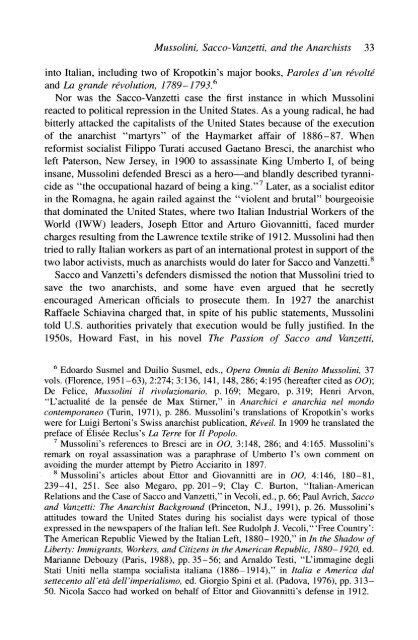Mussolini, Sacco-Vanzetti, and the Anarchists: The ... - Libcom
Mussolini, Sacco-Vanzetti, and the Anarchists: The ... - Libcom
Mussolini, Sacco-Vanzetti, and the Anarchists: The ... - Libcom
Create successful ePaper yourself
Turn your PDF publications into a flip-book with our unique Google optimized e-Paper software.
<strong>Mussolini</strong>, <strong>Sacco</strong>-<strong>Vanzetti</strong>, <strong>and</strong> <strong>the</strong> <strong>Anarchists</strong> 33<br />
into Italian, including two of Kropotkin's major books, Paroles d'un re'volte'<br />
<strong>and</strong> La gr<strong>and</strong>e re'volution, 1789-1793.6<br />
Nor was <strong>the</strong> <strong>Sacco</strong>-<strong>Vanzetti</strong> case <strong>the</strong> first instance in which <strong>Mussolini</strong><br />
reacted to political repression in <strong>the</strong> United States. As a young radical, he had<br />
bitterly attacked <strong>the</strong> capitalists of <strong>the</strong> United States because of <strong>the</strong> execution<br />
of <strong>the</strong> anarchist "martyrs" of <strong>the</strong> Haymarket affair of 1886-87. When<br />
reformist socialist Filippo Turati accused Gaetano Bresci, <strong>the</strong> anarchist who<br />
left Paterson, New Jersey, in 1900 to assassinate King Umberto I, of being<br />
insane, <strong>Mussolini</strong> defended Bresci as a hero-<strong>and</strong> bl<strong>and</strong>ly described tyrannicide<br />
as "<strong>the</strong> occupational hazard of being a king."7 Later, as a socialist editor<br />
in <strong>the</strong> Romagna, he again railed against <strong>the</strong> "violent <strong>and</strong> brutal" bourgeoisie<br />
that dominated <strong>the</strong> United States, where two Italian Industrial Workers of <strong>the</strong><br />
World (IWW) leaders, Joseph Ettor <strong>and</strong> Arturo Giovannitti, faced murder<br />
charges resulting from <strong>the</strong> Lawrence textile strike of 1912. <strong>Mussolini</strong> had <strong>the</strong>n<br />
tried to rally Italian workers as part of an international protest in support of <strong>the</strong><br />
two labor activists, much as anarchists would do later for <strong>Sacco</strong> <strong>and</strong> <strong>Vanzetti</strong>.8<br />
<strong>Sacco</strong> <strong>and</strong> <strong>Vanzetti</strong>'s defenders dismissed <strong>the</strong> notion that <strong>Mussolini</strong> tried to<br />
save <strong>the</strong> two anarchists, <strong>and</strong> some have even argued that he secretly<br />
encouraged American officials to prosecute <strong>the</strong>m. In 1927 <strong>the</strong> anarchist<br />
Raffaele Schiavina charged that, in spite of his public statements, <strong>Mussolini</strong><br />
told U.S. authorities privately that execution would be fully justified. In <strong>the</strong><br />
1950s, Howard Fast, in his novel <strong>The</strong> Passion of <strong>Sacco</strong> <strong>and</strong> <strong>Vanzetti</strong>,<br />
6<br />
Edoardo Susmel <strong>and</strong> Duilio Susmel, eds., Opera Omnia di Benito <strong>Mussolini</strong>, 37<br />
vols. (Florence, 1951-63), 2:274; 3:136, 141, 148, 286; 4:195 (hereafter cited as 00);<br />
De Felice, <strong>Mussolini</strong> il rivoluzionario, p. 169; Megaro, p. 319; Henri Arvon,<br />
"L'actualite de la pensee de Max Stirner," in Anarchici e anarchia nel mondo<br />
contemporaneo (Turin, 1971), p. 286. <strong>Mussolini</strong>'s translations of Kropotkin's works<br />
were for Luigi Bertoni's Swiss anarchist publication, Reveil. In 1909 he translated <strong>the</strong><br />
preface of Elis6e Reclus's La Terre for Il Popolo.<br />
7 <strong>Mussolini</strong>'s references to Bresci are in 00, 3:148, 286; <strong>and</strong> 4:165. <strong>Mussolini</strong>'s<br />
remark on royal assassination was a paraphrase of Umberto I's own comment on<br />
avoiding <strong>the</strong> murder attempt by Pietro Acciarito in 1897.<br />
8 <strong>Mussolini</strong>'s articles about Ettor <strong>and</strong> Giovannitti are in 00, 4:146, 180-81,<br />
239-41, 251. See also Megaro, pp. 201-9; Clay C. Burton, "Italian-American<br />
Relations <strong>and</strong> <strong>the</strong> Case of <strong>Sacco</strong> <strong>and</strong> <strong>Vanzetti</strong>," in Vecoli, ed., p. 66; Paul Avrich, <strong>Sacco</strong><br />
<strong>and</strong> <strong>Vanzetti</strong>: <strong>The</strong> Anarchist Background (Princeton, N.J., 1991), p. 26. <strong>Mussolini</strong>'s<br />
attitudes toward <strong>the</strong> United States during his socialist days were typical of those<br />
expressed in <strong>the</strong> newspapers of <strong>the</strong> Italian left. See Rudolph J. Vecoli,"'Free Country':<br />
<strong>The</strong> American Republic Viewed by <strong>the</strong> Italian Left, 1880-1920," in In <strong>the</strong> Shadow of<br />
Liberty: Immigrants, Workers, <strong>and</strong> Citizens in <strong>the</strong> American Republic, 1880-1920, ed.<br />
Marianne Debouzy (Paris, 1988), pp. 35-56; <strong>and</strong> Arnaldo Testi, "L'immagine degli<br />
Stati Uniti nella stampa socialista italiana (1886-1914)," in Italia e America dal<br />
settecento all'eta dell'imperialismo, ed. Giorgio Spini et al. (Padova, 1976), pp. 313-<br />
50. Nicola <strong>Sacco</strong> had worked on behalf of Ettor <strong>and</strong> Giovannitti's defense in 1912.

















